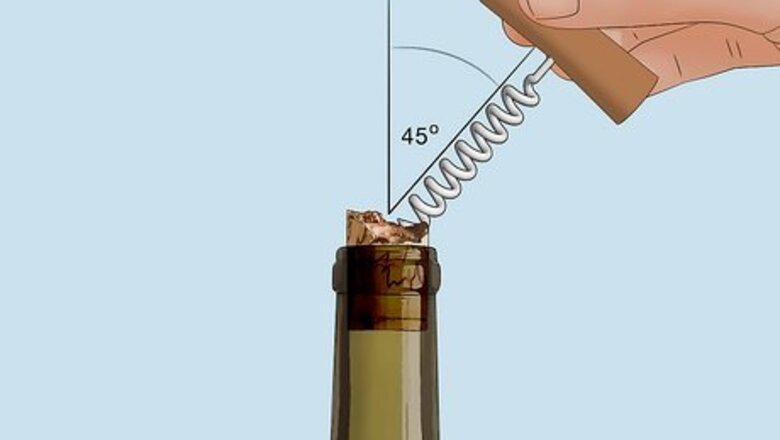
views
- Use the corkscrew at a 45-degree angle to remove the remaining piece of cork. This is the easiest and most effective way to dislodge it.
- Use a knife or a screw and hammer to nab the cork without a corkscrew. As a last resort, put the bottle in a shoe and hit the bottom against a wall.
- If the cork falls apart or gets pushed into the bottle, pour the wine through a filter (like a cheese cloth or coffee filter) into a new container.
Trying the Corkscrew Again
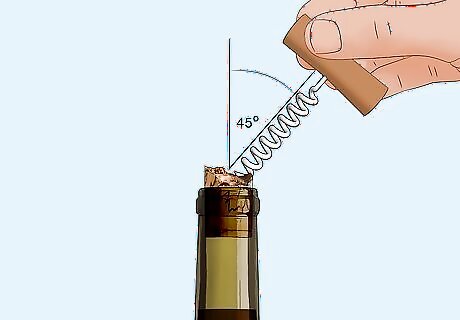
Angle the corkscrew at 45 degrees. If the cork left in the neck is large and fairly close to the opening, try the corkscrew again. Rather than drilling the worm (the long, coiled part) straight through the middle, go at an angle to keep the cork piece intact. If the cork is too far down to get a good, slanted angle, try drilling vertically along the edge of the cork (close to the neck of the bottle). If you have a winged corkscrew, it’s difficult to drill at an angle. Just go through the middle again.
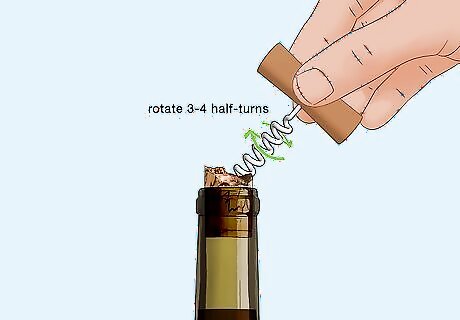
Twist into the cork with light pressure. Turn the corkscrew clockwise to insert it into the cork—you probably only need 3 or 4 half-turns to get a good grip on it. Use light pressure and try not to push while you twist, since this might shove the cork down into the bottle.
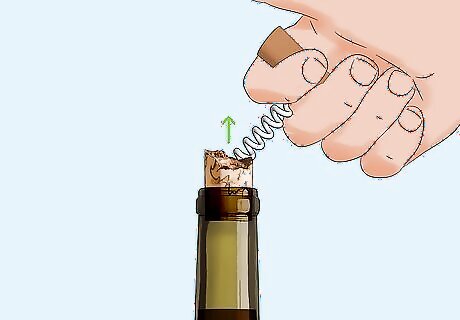
Pull the cork out as you normally would. If you’re using a wine key corkscrew, rest the notch on the lever (the metal arm of the corkscrew) on the lip of the bottle and pull the handle upward to dislodge the cork. If you have a winged corkscrew, just press the wings down to lift the cork. If the cork doesn’t come out all the way, gently pull and twist your corkscrew to fully dislodge it. If the cork comes apart or falls into the bottle, don’t worry! Just filter your wine through a sieve, cheese cloth, or even a coffee filter before drinking.
Using a Screw and a Hammer
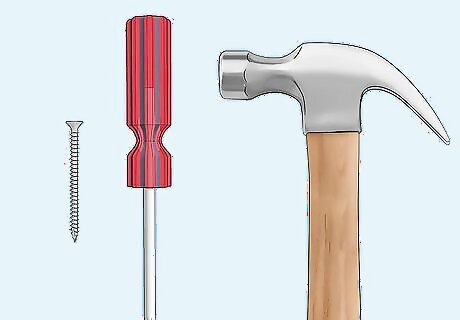
Grab a long coiled screw, a screwdriver, and a hammer. Use a long wood screw or a sheet metal screw. Try to find one that’s about the same length as the worm (the coiled part) of a corkscrew—you need a fair amount to go in the cork, but enough left on top to grip with tools.
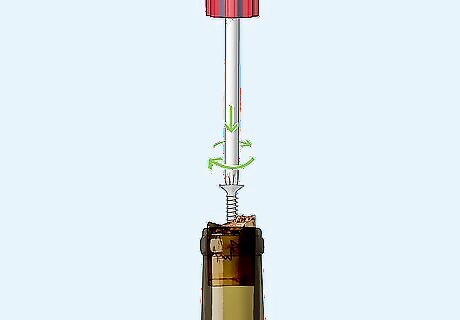
Twist the screw into the center of the cork. If the cork is soft, twist the screw gently by hand. If it’s resistant, use a screwdriver with light force to avoid shoving the cork farther down the neck. If the cork starts sliding, stop twisting and use a knife to make a hole for the screw to slide into more easily. For a good pull, insert the screw about 0.5 inches (1.3 cm) deep into the cork. Try to leave at least half of the screw exposed above the cork to avoid going too deep. Avoid screwing all the way through past the bottom of the cork.
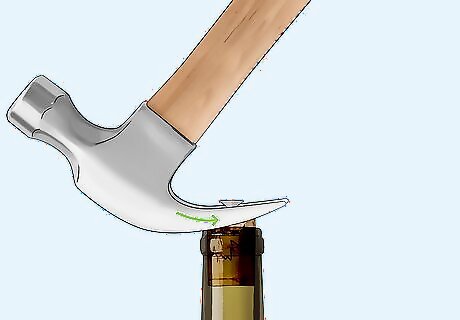
Grip the exposed part of the screw with the claws of the hammer. Slide the claws under the head of the screw until the screw is nestled near where the claws meet. If there’s not enough exposed screw to get a good grip, unscrew it slightly until you have enough room. Alternatively, grip the screw with a pair of pliers instead of using a hammer.
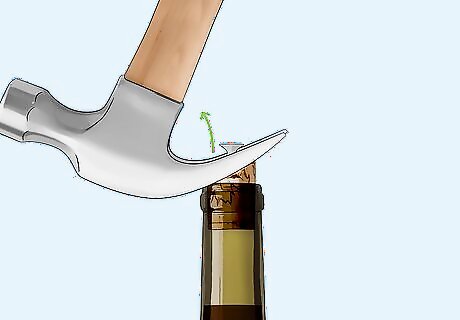
Leverage the hammer against the bottle to pull the cork free. Press down on the hammer’s handle, like you would with a wine key. Try to dislodge the cork in one swift motion (multiple tries might cause it to fall apart even more). If leveraging the hammer doesn’t work or it looks like the cork may break, pull straight upward instead. If you’re using pliers, pull the screw straight up. It might be too awkward to try and leverage the side of the plier handles against the bottle. If the hammer or pliers don’t get the cork out all the way, grab the screw or the cork with your fingers and pull the cork the rest of the way out.
Removing the Cork a Knife
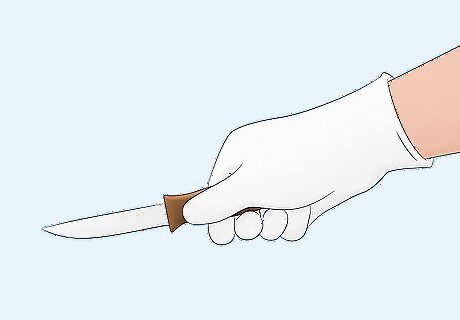
Grab a flat, non-serrated knife thin enough to fit in the neck of the bottle. Choose a sharp one that can push into the cork without much resistance, otherwise you risk the cork getting shoved into the bottle. Clean off the knife with soap and water beforehand. Put on a pair of thick gloves to protect your hands. This is a potentially dangerous method. Only do it if you need to open the wine without a corkscrew.
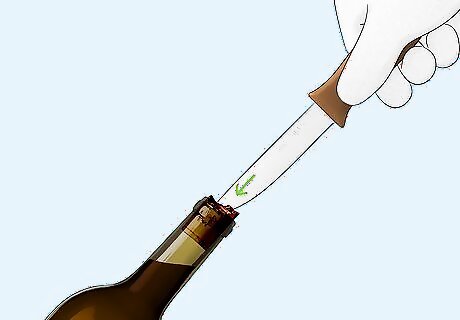
Slide the knife into the edge of the cork, near the bottle. Push at a slight angle so that the tip of the knife burrows toward the center of the cork instead of pushing the knife in vertically. Depending on how much cork is left, push the knife up to 1 inch (2.5 cm) deep. Hold the neck of the bottle firmly with your other hand while you slide the knife into the cork. Make sure not to push the knife into the center of the cork. You’ll get bigger and more powerful turns out of it when it’s close to the edge.
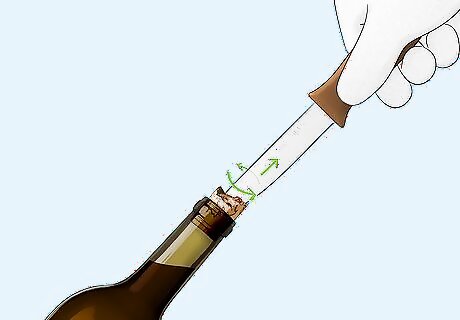
Turn and pull the knife upward. Carefully grab the exposed sides of the blade near the opening of the bottle. Drag the knife in circles around the edge of the bottleneck, pulling upwards while you turn. Keep going until enough of the cork is exposed to grab with your fingers. Turn slowly slowly and carefully to avoid injury (or breaking the cork even more). If you’re hesitant about gripping the blade, use the handle instead. You may not get as strong of a pull, though.
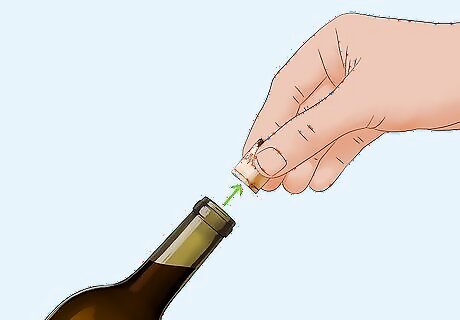
Remove the knife and pull the cork out with your fingers. Twist and pull upward with a little bit of force until it pops out. If it’s too resistant, shove the knife perpendicularly into the side of the cork for leverage. Hold the knife steady with upward pressure while you twist the bottle with your free hand. Be super careful not to cut yourself! If you don’t finish the whole bottle of wine in one sitting, put a new stopper in the bottle or pour the remainder into a container with a lid for storage.
Pushing the Cork Out of the Bottle
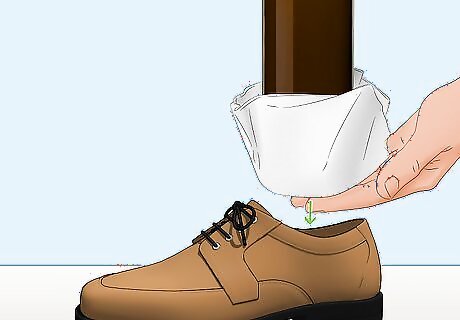
Wrap the base of the bottle in a towel or put it in a hard-soled shoe. If you’re using a towel, make sure it’s layered evenly underneath the bottle to protect the glass and distribute pressure evenly. If you’re using a shoe, go for one with a slight heel or raised sole, like a loafer. This is the potentially messiest and least effective method. Use this as a last resort or if you have zero other tools on hand, like a knife or corkscrew.
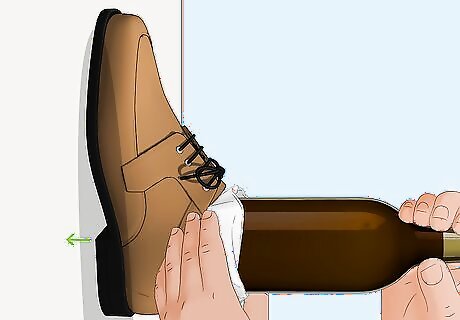
Hit the bottom of the shoe or towel-wrapped bottle against a wall or tree. Grip the shoe or towel in one hand and hold the bottle just under the neck with the other. Firmly smack the base of the bottle flat against the wall, pausing after each hit to check the progress of the cork. Keep going until enough cork slides out to grab with your fingers. If you’re indoors, lay a towel down in case wine spills onto the floor (if possible, do this against an outside wall or a tree so there’s no cleanup). Keep your eye on the cork—if you do one too many hits, the cork will shoot out and foamy wine will spray all over.
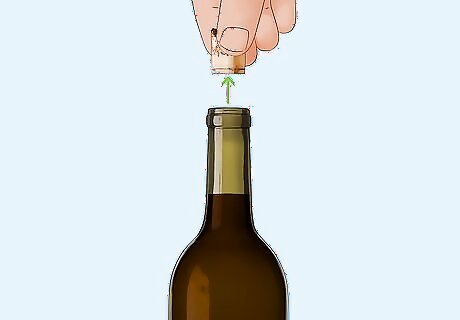
Grab the exposed cork and pull it out by hand. When enough cork is sticking out of the neck for you to get a good grip on, firmly pull and twist it until it dislodges. Once the cork is out, enjoy your wine—you deserve a glass after all that effort!
Filtering Wine with the Cork in the Bottle
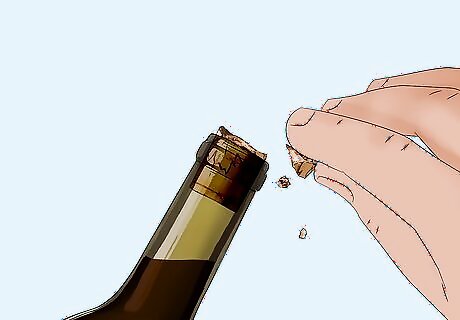
Clear loose cork bits off the top of the cork if it’s still in the neck. Use your fingers or tweezers to remove any cork chunks that got left behind when the cork broke. If the cork is securely stuck, turn the bottle upside down and let the loose bits fall out. Clearing the top of the cork means you’ll have fewer cork bits floating in your wine after you push the cork into the bottle.
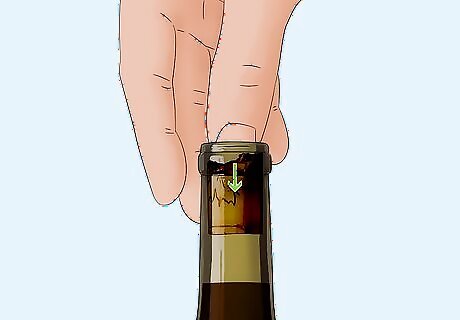
Push the cork down into the wine bottle. Use your finger or a long, slender object like the thin handle of a wooden spoon. Lay a towel down underneath the bottle and take a step back while you push—there’s a chance some wine will splash out as the cork goes in. At this point, you can pour and serve the wine from the bottle if you wish. Just scoop any cork bits out of the wine glass with a spoon before serving. If you have a cork retriever tool, slide the prongs into the bottle and grip the main piece of the cork vertically. Pull the cork up and out.
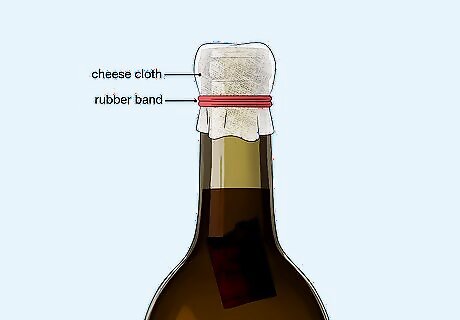
Place a filter over a new container and secure it with a rubber band. Drape a cheesecloth or paper coffee filter over the opening of a decanter or pitcher (any container you have on hand will do). Wrap a rubber band around the container opening to hold the filter in place. Alternatively, wrap the cloth or filter around the neck of the wine bottle so it covers the opening and secure with a rubber band. If you don’t have a cheesecloth or coffee filter, hold a fine kitchen sieve or colander in place over the container opening instead. If you have a bottletop filter, just insert it into the neck of the bottle instead. It will hold back the cork bits while you pour directly from the bottle.
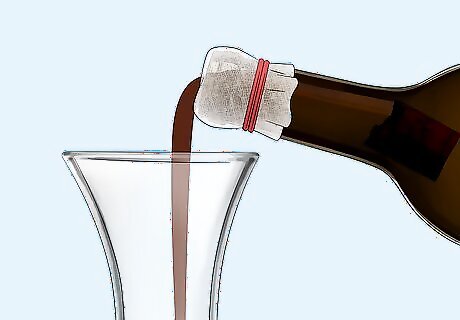
Pour the wine into your decanter or container through the filter. Pour a little bit at a time so that the wine doesn’t build up on top of the filter. If it’s an old, fine red wine, go slowly so you don’t disturb the sediment at the bottom of the bottle. The filter will catch any cork debris in the bottle so that your new serving container is full of nothing but pure wine. Serve directly from the new container and enjoy! If you don’t finish the bottle, put a lid or stopper on the container if you have one that fits (or pour the wine into a different container with a lid to store it). Some people pour the wine back into the bottle once all the cork debris is out. Grab a new stopper if you do this since the cork is no more.




















Comments
0 comment